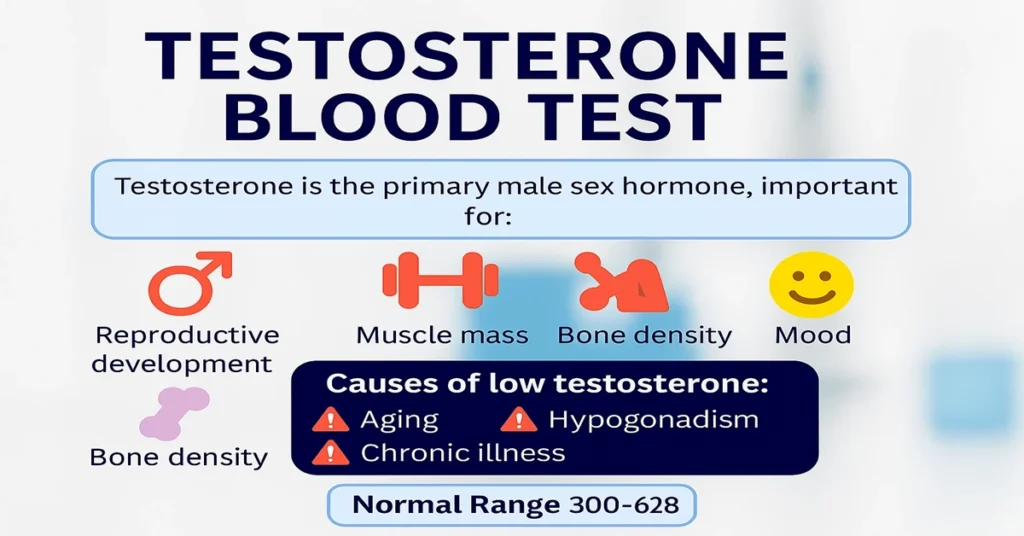Overview
The Testosterone Blood Test measures the amount of testosterone, a key sex hormone, present in your bloodstream. Testosterone plays a crucial role in physical, sexual, and reproductive health — not just in men but also in women.
This hormone influences muscle growth, bone strength, mood regulation, energy levels, and fertility. An imbalance — whether too high or too low — can indicate underlying hormonal or metabolic disorders that may require medical attention.
What is Testosterone?
Testosterone is the primary male sex hormone that is responsible for:
- Male reproductive organ development
- Secondary sexual features such as facial hair, deep voice, and muscle strength
- Sperm production and libido
- Maintenance of bone and muscle mass
Although it is considered a male hormone, women also produce small amounts of testosterone, which are essential for:
- Bone density
- Mood balance
- Sexual function and desire
This test helps doctors diagnose hormonal imbalances, infertility, erectile dysfunction, menstrual irregularities, and endocrine disorders involving the adrenal glands, ovaries, or testes.
Where Testosterone is Produced in the Body
In Men: Testosterone is mainly produced by the Leydig cells in the testes. Its production is controlled by the pituitary gland, which releases luteinizing hormone (LH) to signal the testes.
In Women: Testosterone is produced in smaller amounts by the ovaries and adrenal glands.
Conversion in Tissues: Some testosterone is converted from androstenedione and other hormones in peripheral tissues such as the skin and fat cells.
Main Functions and Importance of Testosterone
Testosterone affects almost every system in the human body. Its major functions include:
- Development of male reproductive organs – testes, prostate, and penis formation during puberty.
- Maintenance of secondary sexual characteristics – body hair, deeper voice, and muscle strength.
- Regulation of sexual function and libido in both men and women.
- Promotion of sperm production and fertility in men.
- Support for bone density and muscle mass, preventing osteoporosis.
- Stimulation of red blood cell production, ensuring proper oxygen transport.
- Influence on mood, motivation, and cognitive performance.
- Assistance in fat distribution and body composition balance.
Causes of Low Testosterone Levels
Low testosterone (hypogonadism) can result from various factors:
- Aging: Testosterone levels naturally decline with age.
- Primary Hypogonadism: Testicular failure or damage due to infection, trauma, or cancer.
- Secondary Hypogonadism: Pituitary or hypothalamic disorders affecting LH production.
- Chronic diseases: Such as diabetes, liver or kidney disorders.
- Obesity or malnutrition: Poor diet can reduce hormone synthesis.
- Medications: Long-term use of steroids, opioids, or corticosteroids.
- Genetic conditions: Such as Klinefelter syndrome.
- Lifestyle causes: Chronic stress, smoking, or heavy alcohol consumption.
Symptoms of Low Testosterone
When testosterone levels fall below normal, symptoms may include:
- Decreased sex drive and erectile dysfunction
- Low energy, weakness, or fatigue
- Loss of muscle strength and mass
- Increased body fat or weight gain
- Depression, mood swings, or irritability
- Fragile bones or osteoporosis
- Low sperm count or infertility
- In women: irregular menstrual cycles, low libido, and tiredness
Causes of High Testosterone Levels
Excess testosterone in the body may occur due to:
- Anabolic steroid or testosterone supplement use
- Testicular or ovarian tumors producing extra hormones
- Congenital Adrenal Hyperplasia (CAH) – a genetic disorder affecting adrenal glands
- Polycystic Ovary Syndrome (PCOS) in women
- Hyperthyroidism or other endocrine disorders
- Adrenal gland tumors that secrete androgens
Symptoms of High Testosterone Levels
High testosterone can also be problematic, leading to:
- Acne and excessively oily skin
- Male-pattern baldness or excessive hair growth
- Aggression, irritability, and mood swings
- Enlarged prostate or higher risk of prostate cancer in men
- Deepened voice, infertility, or irregular periods in women
- Increased muscle mass with low body fat
- Higher risk of cardiovascular disease or blood clots
Reference Ranges
Normal testosterone levels can vary slightly by lab, age, and time of testing.
| Category | Normal Range (Total Testosterone) |
|---|---|
| Adult Men | 300 – 1,000 ng/dL |
| Adult Women | 15 – 70 ng/dL |
| Free Testosterone | Men: 5 – 21 ng/dL Women: 0.5 – 6 ng/dL |
Note: Testosterone levels are usually highest in the morning. That’s why samples are collected early in the day for accurate results.
Sample Type
A venous blood sample (serum) is collected for this test.
Morning collection (around 7–10 AM) is recommended due to natural daily variations in hormone levels.
Test Preparation
To ensure accurate results:
- Fast for 8–10 hours before the test (if advised).
- Avoid heavy exercise or alcohol 24 hours before testing.
- Inform your doctor about any hormone therapy, steroids, or supplements.
- Best sample time: Morning, between 7 AM and 10 AM.
When to Consult a Doctor
You should talk to a doctor or endocrinologist if you experience:
- Unexplained fatigue, loss of muscle mass, or weight changes
- Reduced sexual drive or erectile problems
- Mood disturbances, irritability, or sleep changes
- Irregular periods or symptoms of PCOS in women
- Rapid hair growth, voice changes, or acne
- Fertility issues in either men or women
Abnormal testosterone results often need follow-up tests such as LH, FSH, SHBG (Sex Hormone Binding Globulin), or prolactin levels for complete evaluation.
Important Word Explanations
- Leydig Cells: Cells in the testes that produce testosterone.
- Hypogonadism: A condition where the body produces little or no sex hormones.
- Androgen: A group of hormones (including testosterone) that control male traits.
- PCOS: Polycystic Ovary Syndrome — a hormonal disorder in women causing irregular periods and high androgen levels.
- Cortisol: A stress hormone that can suppress testosterone when elevated.
- Adrenal glands: Small glands on top of kidneys that produce hormones including androgens.
~END~

